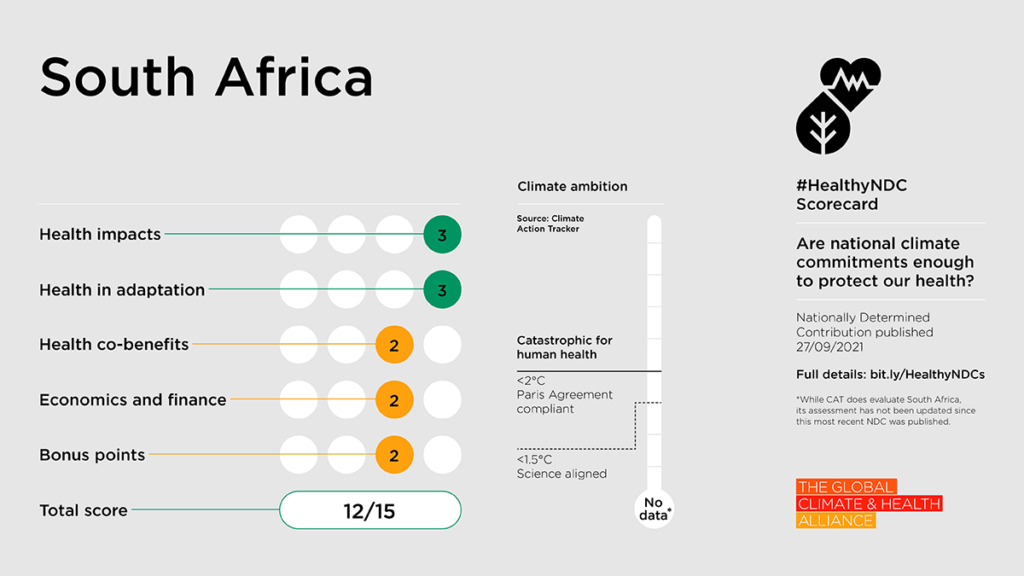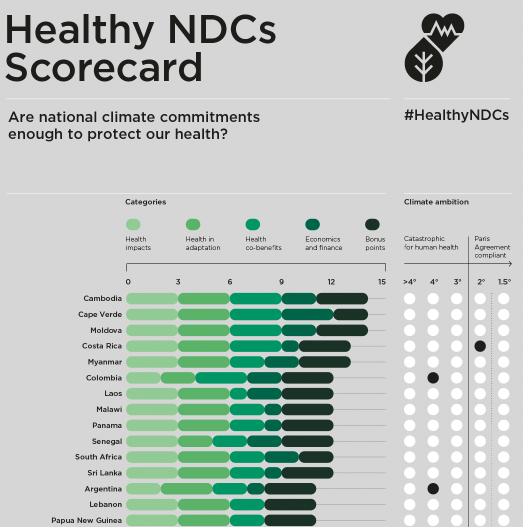- Download latest Healthy NDCs Scorecard graphics
- View scorecards, country summaries and map
- Visit the Healthy NDCs Scorecard webpage (will be on October 19)
- 1st press release, July 2021: Healthy NDCs: Scorecard Exposes Health Gaps in National Climate Policies Ahead of COP26
- 2nd press release, September 2021: Health & Climate Change: Ahead of COP26, Latest Healthy NDC Scorecard Shows Low & Middle Income Countries Leading Action
Johannesburg, October 19, 2021: Ahead of COP26, South Africa is now the leader amongst the world’s 20 biggest emitters of greenhouse gases in taking action to protect its people’s health, according to the third round of Healthy NDCs Scorecards issued today by the Global Climate and Health Alliance [1,2].
South Africa – currently ranked as the world’s 14th largest emitting country – scored 12 out of a possible 15 for its inclusion of health considerations in its updated Nationally Determined Contribution (NDC) [3,4]. In addition to recognising the impacts of heat and air pollution on human health, South Africa noted the need for monitoring, surveillance and early warning systems for climate-induced diseases. Underpinning this, South Africa’s NDC also refers to the right to a safe and healthy environment.
“As a country producing 1.1% of global GHG emissions, South Africa’s level of climate ambition has not yet been assessed since the release of its latest NDC, but the commitment is a substantial improvement from the draft iteration”, said Jess Beagley, Policy Analyst at the Global Climate and Health Alliance [5]. “As an upper middle income country, South Africa’s health score and climate ambition outstrip those of many high income countries, though it must adhere to the lower limit of its target emissions reductions range in order to align with the Paris Agreement target goal of limiting global warming to 1.5C”.
“South Africa’s high score on the Healthy NDC Scorecard shows that high emitting countries can and must integrate health into their climate commitments”, said Jeni Miller, Executive Director of the Global Climate and Health Alliance. “Other countries throughout the world can draw inspiration from South Africa’s commitment to protecting health. In particular, G20 countries, which together account for 80% of global greenhouse gas emissions, must raise their collective ambition and ensure that this month’s G20 Summit in Rome lays the foundation for productive negotiations in Glasgow.”
This third edition of the “Healthy NDCs Scorecard” features 94 NDCs, representing a total of 120 countries (since the EU 27 submits a joint NDC). The scorecard ranks progress of countries towards the inclusion of health within national climate commitments (Nationally Determined Contributions – NDCs) ahead of November’s COP26 climate summit in Glasgow [6]. Three middle income countries, Cambodia, Moldova and Cabo Verde, rank as joint leaders for their consideration of health across five categories, with scores of 14 out of 15. Myanmar joins Costa Rica with 13 points.
At the other end of the scale, Ukraine, and Sao Tome and Principe, join Australia, New Zealand, Norway, Brazil and others with a score of zero. The EU, representing 27 member states, registers just one point, while the US scores six, and the UK seven out of a possible fifteen. More details here.
Countries received scores on the following basis:
- Countries were assigned a score for the extent to which health was included across health impacts, health in adaptation – i.e. strengthening health systems to cope with added burdens, health co-benefits, acknowledgement of economic and financial costs and savings, and bonus points for overall prominence of health, up to a total of 15 points.
- Climate ambition was also considered, since temperature rise will have the greatest bearing on health, but data (from Climate Action Tracker) was not available in all cases, and was not included in the score.
With just two weeks to go until COP26, countries responsible for just 54% of global emissions have submitted an updated or enhanced NDCs, of which only 80 countries have submitted more ambitious commitments compared to previous goals, despite all countries being called to submit updated or enhanced NDCs by the UNFCCC [7]. Among the countries yet to submit are China and India, which together represent a third of the world’s population and produce 30.8% of global emissions [8]. Meanwhile, Australia, Brazil and Indonesia have all resubmitted NDCs but failed to raise ambition compared to previous targets, with Brazil in fact submitting an even less ambitious target [9].
UN Secretary General António Guterres has called for NDCs to be enhanced as often as necessary and without delay until the world is collectively on the right track [10].
“When they signed the Paris Agreement, 197 countries committed to protect the ‘right to health’, and to develop national climate plans to deliver the climate action needed to do so”, said Miller. “However, while the Healthy NDCs Scorecard shows several countries are already committing to a brighter future that will support better health for their own people, and doing their part to limit warming globally, many others are neither meeting their Paris Agreement obligations, nor demonstrating that they have a vision to deliver on health, equity, sustainability, and economic well being together.”
“Urgent action is needed on two fronts: firstly for countries with insufficiently ambitious targets to recalibrate and align commitments with the level needed to protect the human race, and second for countries which have not yet submitted NDCs to finalize and publish their commitments, building health and equity into their climate plans”, added Miller.
Africa’s NDCs
Next year’s COP27 will be hosted in the Africa Region, with Egypt formally nominated to fulfil this role [11]. Several African countries have recently submitted NDCs, with higher than average scores, potentially indicating that COP27 will offer renewed opportunities for coordinated action on health and climate change. Malawi, alongside South Africa, scored 12 points on the Healthy NDCs Scorecard, followed by South Sudan (11 points), Seychelles (10 points), and Liberia, Namibia and Sierra Leone all scoring 9 points. While it includes fewer mentions of health in its NDC, Gambia is the only country evaluated by Climate Action Tracker whose climate ambition is aligned with 1.5 degrees, fully aligning with the Paris Agreement and ultimately protecting health. These nations have strategically prioritised the health of their citizens despite limited resources and pressing competing challenges.
The Global Climate and Health Alliance is calling on governments to ensure that national climate action commitments include:
- Ambitious commitments for greenhouse gas emissions reductions, aligned with Paris Agreement target of 1.5C
- Measures to reduce greenhouse gas emissions that mitigate climate change and also maximise health co-benefits – such as by improving air quality, supporting walking, cycling and public transport use, and increasing access to healthy and sustainable diets.
- Calculation of the associated health costs savings, with health impact assessments that demonstrate these health and economic gains.
- Adaptation strategies which incorporate health and commit investments to build climate smart and resilient healthcare and public health systems.
- Within and beyond NDCs, Covid-19 recovery investments must align with healthy national climate action/commitments, to protect people, the planet and economies, securing a healthy and sustainable future
More information on the Healthy NDC Scorecard is available here.
About the Global Climate and Health Alliance
The Global Climate and Health Alliance is the leading global convenor of health professional and health civil society organizations addressing climate change. We are a consortium of health organisations from around the world united by a shared vision of an equitable, sustainable future, in which the health impacts of climate change are minimized, and the health co-benefits of climate change mitigation are maximised.
Find out more: https://climateandhealthalliance.org/about/
Contacts:
Dave Walsh, Communications Advisor, Global Climate and Health Alliance, +34 691 826 764 (Europe) – [email protected] is checked regularly.
Notes:
[1] Healthy NDC Scorecards https://climateandhealthalliance.org/initiatives/healthy-ndcs/
Press Release, Healthy NDCs: Scorecard Exposes Health Gaps in National Climate Policies Ahead of COP26, Jul 7, 2021
Press Release: Health & Climate Change: Ahead of COP26, Latest Healthy NDC Scorecard Shows Low & Middle Income Countries Leading Action, September 21, 2021
Press briefing: Watch press briefings here (inc presentation PPT) or here on YouTube
[2] COP26 Glasgow, 31 October, 12 November 2021 https://ukcop26.org/
[3] NDC Enhancement Tracker
The Paris Agreement calls on countries to deliver new Nationally Determined Contributions (NDCs) every five years that are informed by the latest advances in technology, science and shifting economic trends.
https://www.climatewatchdata.org/2020-ndc-tracker
[4] South Africa NDC https://www4.unfccc.int/sites/ndcstaging/PublishedDocuments/South%20Africa%20First/South%20Africa%20updated%20first%20NDC%20September%202021.pdf
[5] Climate Watch Explore Nationally Determined Contributions (NDCs)
https://www.climatewatchdata.org/ndcs-explore
[6] United Nations Framework Convention on Climate Change: Nationally Determined Contributions (NDCs)
https://unfccc.int/process-and-meetings/the-paris-agreement/nationally-determined-contributions-ndcs/nationally-determined-contributions-ndcs
Nationally Determined Contributions (NDCs) are national commitments for climate change response, including policies and measures to achieve the global targets set out in the 2015 Paris Agreement. NDCs require regularly updating, with increasingly ambitious targets. The NDCs submitted in the lead up to COP26 will define the course of national climate action until updated NDCs submitted in 2025 come into force.
[7] NDC Enhancement Tracker
https://www.climatewatchdata.org/2020-ndc-tracker
[8] Climate Watch Explore Nationally Determined Contributions (NDCs)
https://www.climatewatchdata.org/ndcs-explore
[9] Countries not taking further action to increase 2030 climate action
https://climateactiontracker.org/climate-target-update-tracker/list-non-updating-countries/
[10] Secretary-General, Milan, Italy 30 September 2021: Remarks to Pre-COP26
https://www.un.org/sg/en/node/259808
[11] Egypt “selected as nominee” to host COP27 climate talks – U.S. envoy Kerry, Reuters, October 2, 2021:
https://www.reuters.com/world/africa/egypt-selected-nominee-host-cop27-climate-talks-us-envoy-kerry-2021-10-02/



